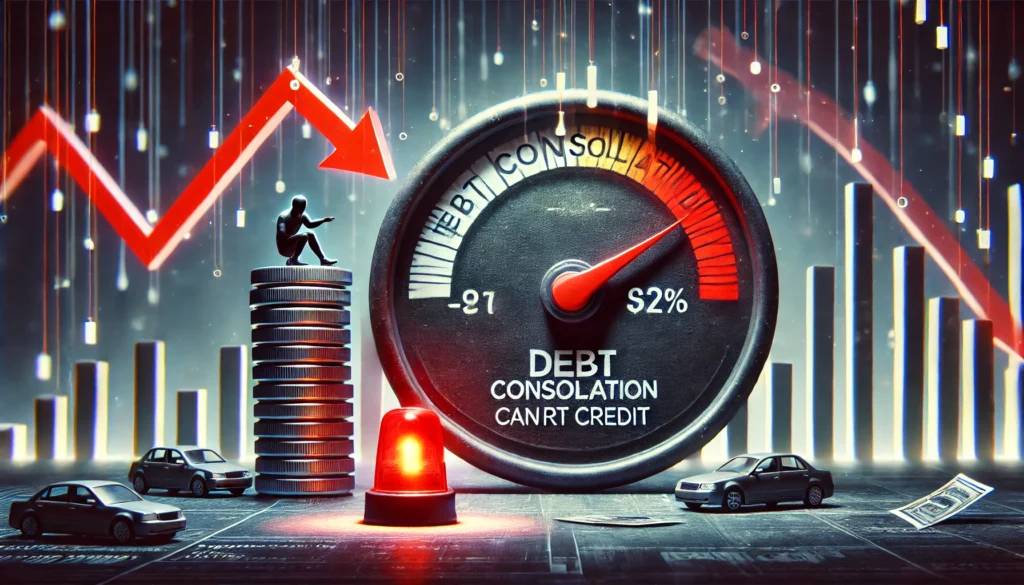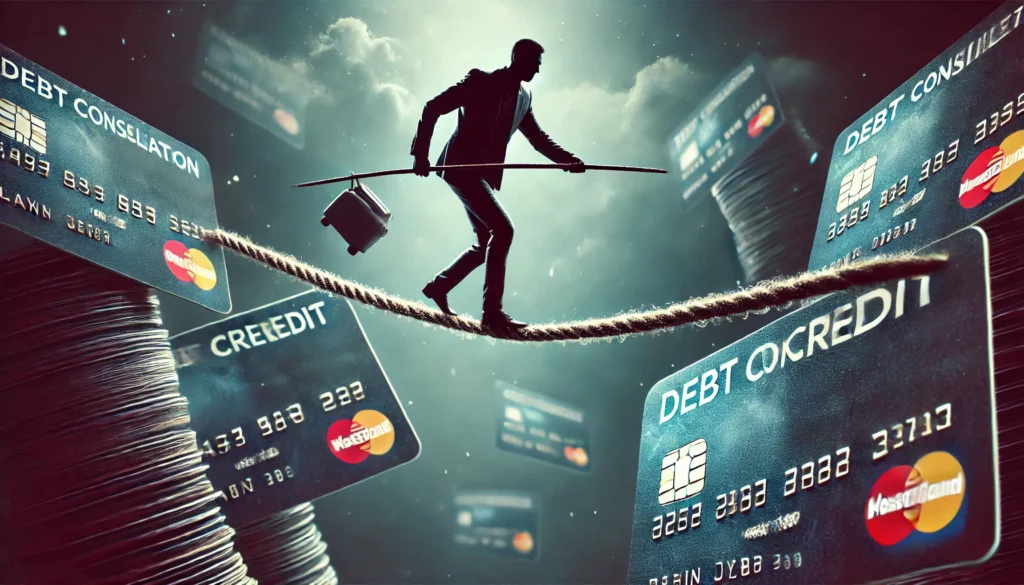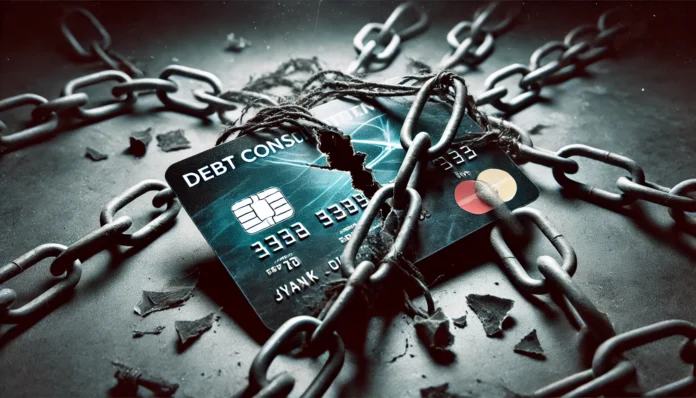Understanding Debt Consolidation and Its Impact on Credit
Debt consolidation is a financial strategy that many borrowers, including student loan holders, consider when managing multiple debts. It involves combining multiple loans into a single payment, often with a lower interest rate or an extended repayment period. However, a common concern among borrowers is: does debt consolidation hurt your credit? This question is crucial, as a good credit score is essential for securing favorable financial opportunities in the future.
You may also like: Federal Direct Consolidation Loan: A Smart Strategy to Simplify Student Debt
When evaluating whether debt consolidation affects your credit, it is essential to understand the various ways in which this process interacts with credit scores. A consolidation loan can influence factors such as credit utilization, account age, and payment history. While debt consolidation can provide relief by simplifying debt management, it is important to assess its potential short-term and long-term impact on creditworthiness.

The Mechanism of Debt Consolidation and Credit Scores
To determine does debt consolidation affect your credit, it is essential to break down how credit scores are calculated. The FICO scoring model, one of the most widely used credit scoring systems, considers five major factors: payment history, amounts owed, length of credit history, new credit, and credit mix. Debt consolidation interacts with these factors in different ways.
When a borrower consolidates multiple debts into a new loan, their credit report will reflect the closure of old accounts and the opening of a new account. This can temporarily lower the average age of credit, which may cause a slight dip in credit scores. Additionally, applying for a new loan typically results in a hard inquiry on the credit report, which may lead to a minor score reduction. However, in the long run, consistent, on-time payments on the consolidation loan can help improve credit health.

Does a Consolidation Loan Affect Credit Positively or Negatively?
A consolidation loan can impact a borrower’s credit profile both positively and negatively, depending on how it is managed. The key question many borrowers ask is, does a consolidation loan affect credit in a detrimental way? The answer depends on factors such as responsible payment behavior and how the new loan affects credit utilization.
One of the main benefits of a consolidation loan is that it simplifies debt repayment. Instead of managing multiple due dates and payment amounts, borrowers only have to keep track of a single monthly payment. This reduces the risk of missed payments, which is crucial because payment history accounts for 35% of a FICO score. If a borrower makes timely payments on their consolidation loan, their credit score is likely to improve over time.
On the other hand, taking out a new loan increases the total amount of debt owed, which can negatively impact the amounts owed category of a credit score. If the new loan does not significantly reduce overall credit utilization, it may not provide an immediate benefit to credit health.
Will Debt Consolidation Hurt My Credit in the Long Run?
A major concern for borrowers considering consolidation is, will debt consolidation hurt my credit over the long term? The long-term effects of debt consolidation largely depend on a borrower’s financial behavior post-consolidation.
If the borrower successfully manages their consolidated loan, making regular on-time payments and avoiding additional debt accumulation, their credit score can recover and even improve. However, if they continue to accumulate new debt while repaying the consolidation loan, they may find themselves in a worse financial position than before. A disciplined approach to debt repayment is essential for achieving positive results.
Additionally, closing old credit accounts can reduce the length of credit history, which is another factor in credit scoring. If possible, borrowers should keep older credit accounts open, especially those in good standing, to maintain a longer credit history and avoid unnecessary score reductions.

How to Consolidate Credit Card Debt Without Hurting Your Credit
For borrowers seeking to consolidate credit card debt while preserving their credit score, there are strategic approaches to minimize negative impacts. Understanding how to consolidate credit card debt without hurting your credit is crucial for making informed financial decisions.
One strategy is to choose a balance transfer credit card with a 0% introductory APR period. This allows borrowers to consolidate debt without accruing additional interest, provided they pay off the balance before the promotional period ends. Another approach is selecting a personal loan for debt consolidation, ensuring that the loan terms align with the borrower’s financial capabilities.
Furthermore, maintaining a low credit utilization ratio after consolidation is important. Borrowers should resist the temptation to max out credit cards again after consolidating their debt. Instead, keeping old credit card accounts open and maintaining low balances can support overall credit health.
Frequently Asked Questions (FAQ)
Does debt consolidation hurt your credit in the short term?
Debt consolidation can initially impact your credit score due to factors like credit inquiries and changes to your credit utilization. When you apply for a consolidation loan, the lender performs a hard inquiry, which may lower your score by a few points. Additionally, if old accounts are closed after consolidation, it may shorten your credit history, affecting your score temporarily. However, if managed properly, consolidation can improve your credit over time by reducing missed payments and lowering overall credit utilization. The key is to ensure that you make timely payments and avoid accumulating new debt while repaying the consolidation loan.
Does a consolidation loan affect credit in the long run?
A consolidation loan can have a positive long-term effect on your credit if used strategically. By converting multiple high-interest debts into a single manageable payment, you reduce the risk of missing payments, which is crucial for maintaining a strong credit score. Additionally, consistently paying off a consolidation loan can demonstrate financial responsibility to lenders. However, if the loan comes with high fees or an extended repayment term, you might pay more interest over time, which could limit financial flexibility. Choosing the right consolidation plan tailored to your financial situation ensures that the benefits outweigh any potential drawbacks.
How can you consolidate credit card debt without hurting your credit?
Understanding how to consolidate credit card debt without hurting your credit involves choosing the right method and maintaining responsible repayment habits. A balance transfer credit card with a 0% introductory APR can be a great option if you can pay off the debt before the promotional period ends. Personal loans are another effective strategy, especially if they come with lower interest rates than your current credit cards. Additionally, working with a nonprofit credit counseling agency can provide structured repayment plans without damaging your credit. The most important factor is ensuring that consolidation does not lead to missed payments or increased borrowing, as these can negatively impact your credit score.
Does debt consolidation affect your credit score differently based on the type of loan?
Yes, different types of consolidation loans can affect your credit score in unique ways. Personal loans for debt consolidation may temporarily lower your score due to a hard inquiry but can improve your score over time with consistent payments. Balance transfer credit cards can be beneficial if used responsibly but may increase credit utilization if old accounts are closed. Home equity loans and lines of credit can offer lower interest rates, but defaulting on them could lead to serious financial consequences, including foreclosure. The impact of debt consolidation and credit score changes largely depends on how well you manage the new debt structure.
Is debt consolidation bad for credit score improvement efforts?
Debt consolidation is not inherently bad for credit score improvement but must be handled carefully to yield positive results. The misconception that consolidation ruins credit comes from instances where borrowers fail to manage new loans effectively. If consolidation helps you make consistent payments, lower credit utilization, and reduce financial stress, it can be a valuable tool for rebuilding your credit. However, taking on new debt while consolidating can create a cycle of borrowing that ultimately damages your score. The best approach is to consolidate only when you have a clear repayment strategy and can avoid accumulating additional debt.
Will a debt consolidation loan ruin my credit if I miss payments?
Missing payments on a consolidation loan can have serious consequences for your credit score. Payment history is one of the most significant factors affecting your credit, and late payments can drastically lower your score. Additionally, defaulting on a consolidation loan can lead to collections, further damaging your credit standing. To prevent this, setting up automatic payments or reminders can help ensure timely payments. If you’re struggling to make payments, communicating with your lender to explore alternative repayment options may help prevent negative credit impacts.
Does bill consolidation affect your credit differently than other types of debt consolidation?
Bill consolidation can affect your credit depending on how it’s structured and managed. Some bill consolidation programs involve negotiating lower payments with creditors, which may appear as settled accounts on your credit report, potentially lowering your score. In contrast, using a personal loan to consolidate bills can positively impact your credit by improving payment consistency and lowering utilization. It’s crucial to research the specific bill consolidation method you choose to ensure it aligns with your financial goals. Additionally, avoiding unnecessary new debt after consolidation is key to maintaining a stable credit profile.
What does debt consolidation do to your credit in terms of credit utilization?
Debt consolidation can positively impact your credit utilization ratio if handled correctly. By shifting high-interest debt to a new loan or balance transfer card, you may reduce the amount of revolving credit you use, which can improve your credit score. However, if the new loan has a high utilization rate, or if credit card accounts are closed post-consolidation, it could temporarily lower your score. Maintaining old accounts with zero balances and keeping credit utilization low can help mitigate any negative impact. Responsible management of consolidated debt ensures that it contributes positively to your overall credit health.
Do debt consolidation loans affect your credit score more than paying off debt gradually?
Debt consolidation loans can affect your credit score differently compared to gradually paying off debt. Consolidation provides the advantage of simplifying payments and potentially lowering interest rates, which can improve payment consistency and reduce overall debt burden. However, gradually paying off debt without consolidation allows you to maintain existing credit history without the potential short-term dip from new credit inquiries. The best approach depends on your financial habits—if you struggle with multiple payments, consolidation may be beneficial, whereas disciplined budgeting can make gradual repayment just as effective. Understanding the impact of both strategies helps you choose the best path for maintaining and improving your credit score.
Does credit consolidation hurt your credit if done through a debt management program?
Credit consolidation through a debt management program may have an initial impact on your credit but can ultimately help rebuild it. Some creditors may close accounts as part of the program, which could shorten your credit history and temporarily lower your score. However, since these programs often reduce interest rates and provide structured repayment plans, they help borrowers regain financial stability. Successfully completing a debt management program demonstrates financial discipline and can lead to long-term credit improvement. Evaluating the pros and cons of debt consolidation and credit score changes ensures that you make an informed financial decision.
Final Thoughts: Is Debt Consolidation the Right Choice?
Ultimately, does debt consolidation ruin your credit? The answer depends on how the process is handled. Debt consolidation has the potential to temporarily lower a credit score due to new credit inquiries and account changes. However, with disciplined financial management, it can serve as an effective tool to improve credit over time.
Borrowers should carefully assess their financial situation before pursuing consolidation, ensuring that they have a clear repayment strategy in place. Seeking guidance from financial advisors or credit counselors can provide valuable insights into whether consolidation aligns with long-term financial goals.
credit score impact, student loan management, financial planning, debt relief strategies, credit card debt consolidation, student debt solutions, loan repayment options, financial literacy, credit health improvement, responsible borrowing, loan consolidation benefits, debt management tips, personal finance advice, credit building strategies, interest rate reduction, credit history preservation, financial stability planning, smart borrowing decisions, loan refinancing options, effective debt repayment
Further Reading:
What Is a Debt Consolidation Loan? Does Debt Consolidation Hurt Your Credit?
Does Debt Consolidation Hurt Your Credit?
Does Debt Consolidation Hurt Your Credit?
The information provided in this article is for general informational purposes only and is not intended to constitute financial, investment, legal, tax, or other professional advice. The content should not be relied upon for making any financial or investment decisions. Readers are encouraged to consult with licensed professionals, such as financial advisors, attorneys, or tax experts, to obtain personalized advice tailored to their individual circumstances. The author and publisher disclaim any liability for any actions taken or not taken based on the information provided in this article.





